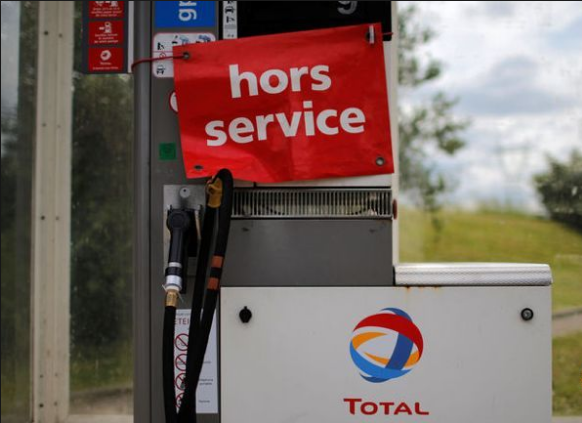Strikes by French oil sector workers protesting proposed labour reforms spread to all the country’s refineries on Tuesday, sapping petrol stations dry and creating delays for tankers at major ports.
France has been hit by a wave of strikes over the past week aimed at forcing President Francois Hollande’s socialist government to withdraw proposed new labour market rules.
Striking workers have blocked fuel depots and oil terminals, disrupting distribution of gasoline and other refined products. By Tuesday a quarter of the country’s network of 11,500 petrol stations had run dry, prompting Prime Minister Manuel Valls to declare: “Enough is enough.”
France is western Europe’s third-biggest oil refiner, behind Germany and Italy, according to the JODI-World Oil Database, with a total refining capacity of nearly 1.5 million barrels a day of oil, equal to around 1.5 percent of global daily crude demand.
The impact on the oil price has been limited so far: though the strikes have curbed demand from refineries, Brent crude was up nearly 1 percent on Tuesday at $48.73 a barrel on expectations that data would show a U.S. supply overhang was shrinking.
But with just a couple of weeks to go before the kick-off of the Euro 2016 football tournament in France, which is expected to attract more than a million foreign visitors, the government is under pressure to act quickly to free up flows of crude oil and refined products.
“The European football championship starts on June 10 in France and we don’t think that the government will allow for all retail stations to be empty for that event. There will, therefore, likely be an import pull for diesel cargoes during June and July,” Petromatrix oil strategist Olivier Jakob said.
A prolonged refinery strike in France in 2010 led to a glut of crude in Europe because it could not be delivered to refineries, and a spike in refined products prices due to low output from refineries.
Refining margins for diesel fuel have already risen 15 percent in the space of a week, to their highest level since November.
That is a potentially unwelcome development for drivers in France who, like car owners around the world, have enjoyed a long period of cheap fuel.
Traders and shipping sources said queues of tankers had formed off the port of Le Havre in northern France, which services Total’s 247,000-bpd Gonfreville plant, the country’s biggest refinery, as well as Exxon’s 240,000-bpd Port Jerome facility.
At Fos in the south, where Exxon runs a 140,000-bpd refinery, protesters caused damage to the road and railway running to the plant and the company said it was unable to load any products onto distribution trucks.
“The strike at the port of Le Havre will limit the intake of cargoes and might cause some cargoes to stay afloat, but once the strikes are over, there should be some supportive impact on the cargo market as inland stocks will need to be rebuilt, something that will also be the case if strategic stocks are released,” Petromatrix’s Jakob said.
Crude oil traders said there were no signs yet of distress in the market, of cargoes being diverted to other ports, or of owners of physical barrels being forced to sell at steep discounts just to get rid of their oil.
Still, traders said it was probably just a matter of time before charges on ships for late arrival at destination ports, or demurrage, start to rise and owners of physical cargoes may have to fight harder to find buyers for their oil.
The flip side for the oil market at least is that with French refineries either shut or running at minimum levels, an overhang of excess refined products in Europe is likely to clear up more quickly.
“The combination of upstream production outages and French strikes are going … to clean up a bit of the overhang in both crude and products. But it will depend on how long either last,” one trader said.
Copyright Ships & Ports Ltd. Permission to use quotations from this article is granted subject to appropriate credit given to www.shipsandports.com.ng as the source.

